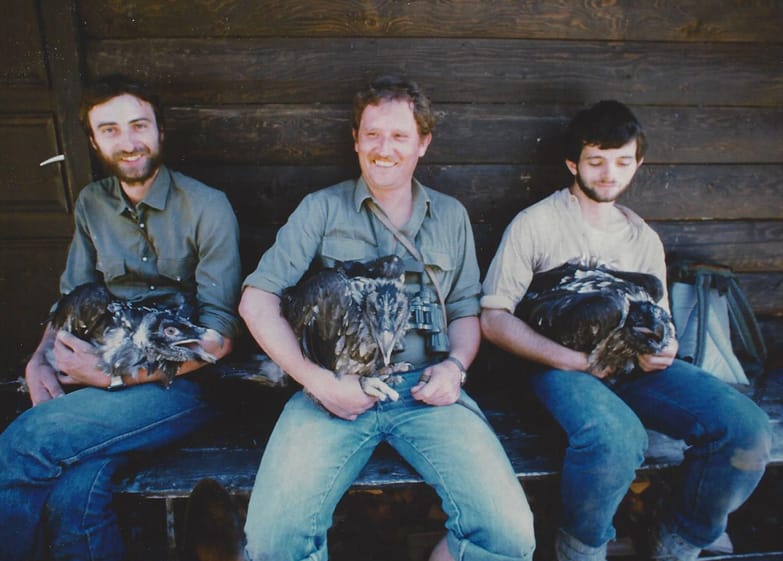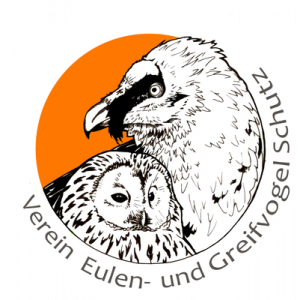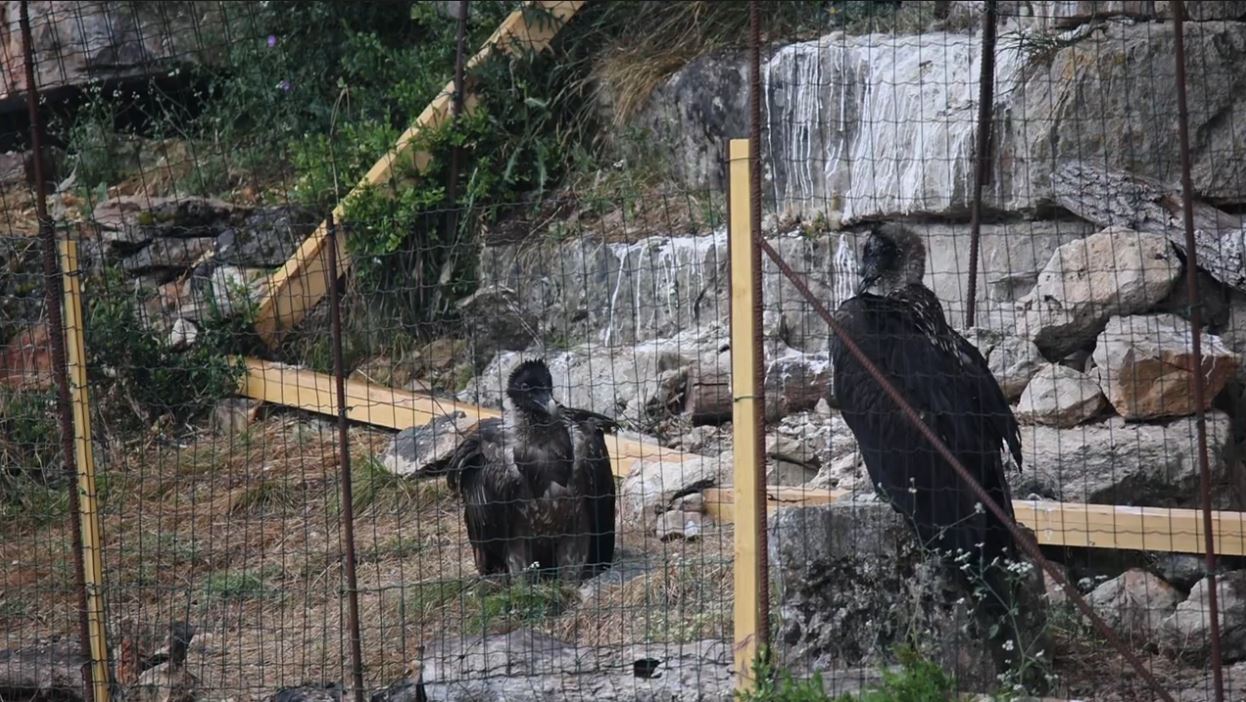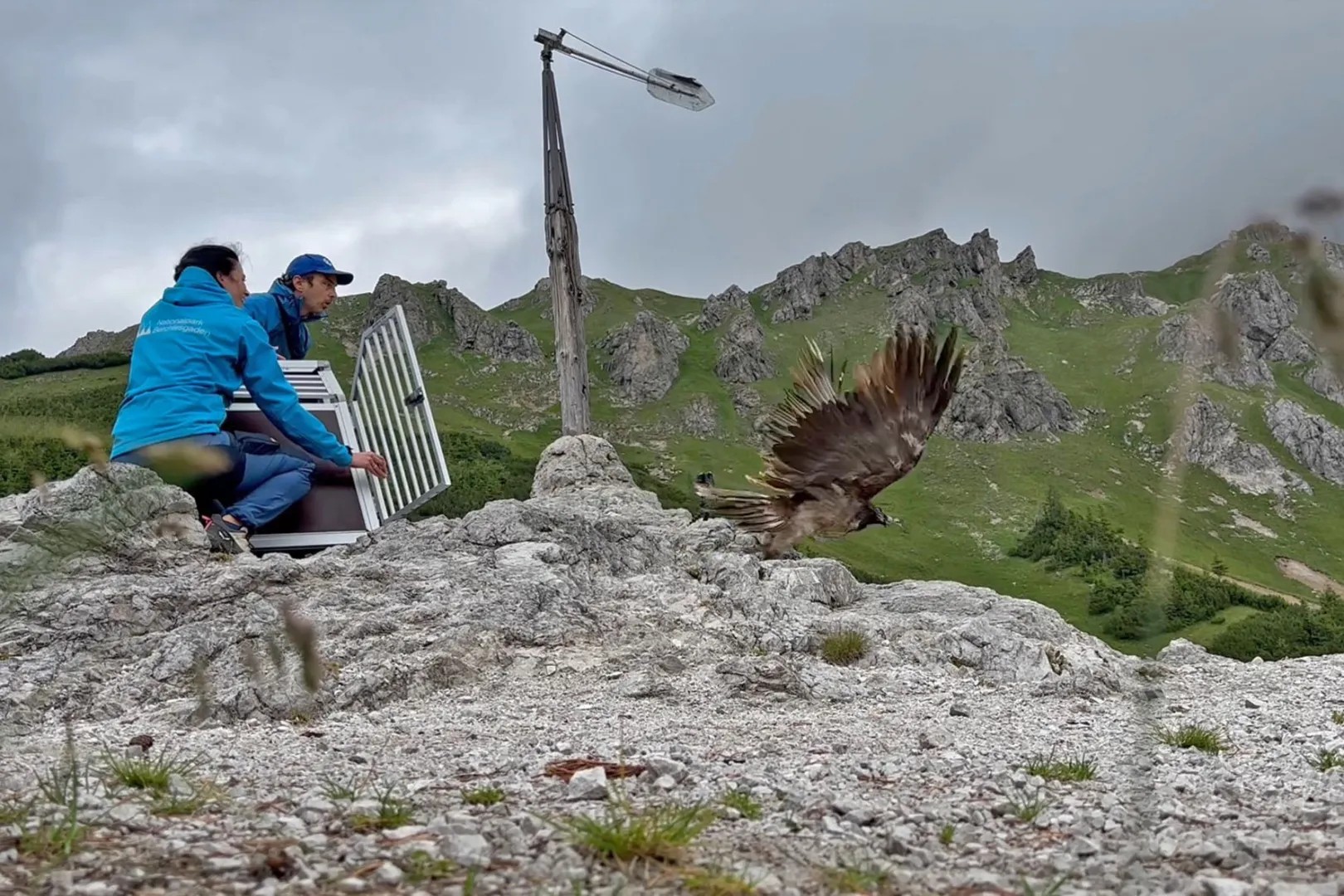A sad loss for the Bearded Vulture Captive Breeding Network (Bearded Vulture EEP), as Winnie, one of the first Bearded Vultures released in the Alps died at the Richard Faust Specialised Bearded Vulture Breeding Centre (RFZ) in Austria. Due to her poor health state, we had to make the difficult decision of euthanising Winnie.

Winnie’s poor health state forced us to take the saddest decision
Bearded Vulture Winnie, BG091, had just completed 37 years at the Richard Faust Specialised Bearded Vulture Breeding Centre (RFZ) in Austria. With a very dominant character and some aggressiveness towards the males she was paired with, Winnie was a tough Bearded Vulture. Winnie was sent to the RFZ to be a foster mother in 2021 after the last male with whom she successfully bred died.
Since the beginning of May, Winnie started showing signs that something wasn’t well with her health. Winnie’s condition worsened, and she spent four days lying on the ground, apathetic. On 12 May, still lying on the ground and showing no reaction to the human keepers, the team had to make the always difficult choice of euthanising her.
Winnie, one of the first Bearded Vultures released in the Alps, died, but her life will be forever remembered
Bearded Vultures were extinct in the Alps for more than seven decades. The last individual was shot to death in 1913 at Aosta Valley in the Italian Alps. In 1978, a group of nature conservationists from across the Alpine countries and the Vulture Conservation Foundation started an ambitious endeavour: to bring the Bearded Vulture back to the Alps. The project aimed to produce chicks in captivity and release them into the wild.
Finally, in 1986, together with the Bearded Vultures “Hans”, “Fritz”, and “Ellen”, Winnie was released in Austria’s Hohe Tauern National Park. The birds were carried in special transport boxes to a modified hacking that mimicked the natural way of fledging. It was the first time such a release method was being tested, setting a turning point for species conservation in Europe. The four birds were named after people who played a vital role in the restocking project.
“The most exciting was the practical experiment of the release method, used for the first time after many years of discussion: the modified hacking, an imitation of the natural fledging and emancipation in the wild. In the meantime, hundreds of Bearded Vultures fledged successfully using this “soft release method” and became independent from any human supply.”
Hans Frey, one of the pioneers involved in the reintroduction project and founder of the RFZ, where he still is the Director

From Grünau to the Richard Faust Specialized Breeding Center
Winnie hatched on 3 May 1986 from a sibling pair, BG005 x BG006, both descendants from the 1st old breeding pair from the AlpenZoo in Innsbruck, the pair that has inspired the small group of people to start the reintroduction project in the Alps with captive-bred chicks. At that time, Winnie’s parents were at the Wildpark Cumberland Grünau in Austria. On 21 February 1986, their single clutch was removed and transferred to RFZ to be adopted by the foster pair BG 004 x BG 027. A week before hatching, the egg was artificially incubated, and after 12 days of hand-rearing, Winnie was adopted by another foster pair, BG 007 x BG 012.
Into the wild… and back to captivity
Winnie was released on 6 July 1986 in Krumtal (Hohe Tauern National Park), where she fledged without problems. However, only one year later, in October 1987, she was found at a river shore with frozen feathers and entered RFZ to receive health care. In 1988, Winnie was transferred to Haute-Savoie’s breeding centre (currently managed by Asters) to be paired with male BG087. However, with her dominant behaviour, no pair bonding ever occurred. 10 years later, she was transferred back to RFZ, and after trying to be paired a couple of times, she finally did it with BG174. Both were transferred to Goldau Zoo, where their first chick, BG363, successfully hatched. As Winnie kept showing aggressiveness towards the male, she was removed from the aviary. The chick was reared by its father alone and released in Switzerland.
Always showing some aggressiveness towards potential partners, after another try with other two males, she paired with the male BG060. In 2019, her 2nd chick was produced, BG1025, which was reared by the female alone and released in Andalusia. In 2021, due to the death of her pair, she was sent back to RFZ, where she died on 12 May 2023. Winnie’s mother, BG006, is still alive at RFZ and yearly rears chicks as a foster mother.

The critical role of captive-breeding
For us at the VCF, coordinators of the Bearded Vulture Captive Breeding Network on behalf of EAZA’s EEP, the loss of an adult bird is always an unfortunate event. Since the first Bearded Vulture releases in 1986, more than 560 juvenile Bearded Vultures were produced in captivity so far and over 340 have been released into the wild, helping to restock and reinforce Bearded Vulture populations in 5 different regions.
This breeding season, thanks to the hard work of human keepers across the network, which involves more than 40 organisations, we have achieved a record in the number of eggs laid and chicks hatching. 47 breeding pairs have laid 80 eggs, from which 36 have hatched, and only one chick has died, with 35 still alive. Once the captive-bred vultures are around 90 days old, they are released into priority areas where the species have disappeared or is threatened. This year, Bearded Vultures have already been released in Andalusia, South-eastern France and the Bavarian Alps.

Stay tuned to the coming releases, by following our social media networks: Facebook, LinkedIn, Twitter and Instagram!






